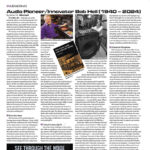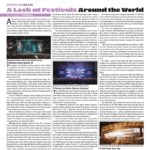
Live Sound Pros Share Experiences, Ideas on Moving Forward
In the midst of our nation’s long-overdue reflection on American society’s continuing problem of racism and our industry’s shortcomings in terms of ethnic diversity, we reached out to three prominent African American professionals to hear about their experience, thoughts and ideas on how we as an industry can be more inclusive.

Kyle Hamilton
Upon graduating high school, Pasadena native Kyle Hamilton was at a crossroads. At 6’3”, he could either pursue a career in football or pursue music, his first love. He went with his “first love” and enrolled at the Los Angeles Recording School. After several years working gospel plays, he landed his first major tour with The Isley Brothers. From there he continued to work his way up, landing such gigs as Mary J. Blige, Stevie Wonder, Prince, Rihanna, and Janet Jackson among others.
For 27 years, I’ve been blessed with the opportunity to do something that doesn’t feel like work — I love what I do. But even with me winning the Parnelli Award for FOH Engineer last year, I learned that I was the first black engineer to win the award. When I arrived at the ceremony, there wasn’t even a seat for me provided by the ceremony. Instead I took up a seat from the sound company that was the vendor for the tour I won the award for. From the 800 or so people in that room, I counted maybe six people of color. So the victory was bittersweet. If you look around our industry, urban/R&B music takes up at least 45 percent of the touring industry. But not even one percent of us were represented at that award show. Furthermore, on the R&B tours I’ve been on, the crew is at least 90 percent white. There’s a big disparity in representation.
Experiences
First of all, I’m a large black guy — 6’3”. I’m textbook in terms of having the look of someone who might seem “threatening.” So there’s that. Then there have been many situations where I show up to work FOH and am mistaken to be security or a band member or a stagehand. People aren’t used to seeing many black people in that position and assume I’m in the wrong area. You can see the surprise when they find out otherwise, especially in Southern states. There have been other situations where people have assumed that my advancing was wrong because I couldn’t possibly know how to properly use the gear I’ve ordered, because the things were “too” advanced. I’ve walked in on conversations of people talking about how I’m ordering all this stuff and I better know how to use it. It’s unfortunate.
What can we do?
I’ve seen the lack of diversity in so many camps I’ve been a part of that I go out of my way to try and give opportunities to those that aren’t represented. With my company NeverSleep Productions, I try to not only mentor, but hire people of color and women. At some point, you need to give people the opportunity to ascend and I’m happy to be able to do so. Sometimes all you need is that opportunity and what you do with that afterwards is your business. But I always want to give that chance to people. My position as one of the top black engineers allows my words to speak volumes, and I make it my business to use my reputation to put others in up-and-coming positions. I’m going to throw a job to whoever is the best fit and that might be a woman, a black person, a Latino — it all depends on the personality of the camp.
On Mentoring
For me personally, I’m always talking to kids. There are so many career opportunities that we just don’t know about. I tell them there is way more to entertainment than just being in front of the microphone. I just did a presentation for eighth graders letting them know all the things that happen behind the scenes and how successful you can be. Often times, our longevity in the field is longer than the actual artist. We can go 15, 20 plus years in this industry when many artists fizzle out in a few years. It really can be a fun and rewarding career. Like I said, I love what I do, and I tell them how lucrative it can be. You just have to make sure you don’t get crazy and spend it all on the road so you can bring it back home!

Amanda Davis
Amanda was profiled in a FOH feature in 2018, and was one of the first “Parnelli NextGen” honorees. From Memphis, she attended college to be an opera singer then switched to audio engineering. She worked churches and cruise ships before she was hired to mix for Janelle Monáe, and her career has skyrocketed with hers. Tegan and Sara are also clients.
A couple of times I’ll show up to the venue, after having multiple advance calls, and the tech on site is still looking for the FOH “guy,” looking right over me.
I’ve been with Janelle seven years, and it was a conscious decision on her part to hire a black woman for the FOH position. Other artists can do that, too, and then maybe there’ll be less crews with a bunch of white boys. Look at your crews and if you don’t see any blacks, think about rectifying that. Otherwise, when a crew like Janelle’s walks into the room, there is a raising of the eyebrows. I’ve literally been told “I didn’t know what to expect.” Well, why didn’t you know what to expect? There’s a reason I’m here with an artist who sold out the show and why aren’t you self-aware enough to expect me? I would implore people to be more aware of the fact that you saying that to someone could be offensive.”
Experiences
I was on a remote when a system tech came in, spoke to and/or introduced himself to everyone but me. I didn’t say a word. I just had the thought “It’s going to be one of those days and here we go again.” Turns out he had seen me mix a Janelle show a few months before. I was ok to acknowledge after that realization.
I think a lot of people like being in their comfort zone, and that means hiring who they know, and most times, who they know look like them. If you really want to be inclusive you have to go out of that comfort zone. If someone is saying, “I want to be more inclusive,” then go out and find those people! [Laughs] I understand the idea of a production manager hiring their friend or someone they’ve worked with before. I totally get that and understand wanting to have assurance that the job gets done. But at the same time, there is plenty of evidence that other people outside that circle can do the gig. Having an apprehensive feeling as if you don’t know if someone like me will work out is not a good excuse. There is evidence that I or other people of color will bring a high level of professionalism and skills to that job. So step out of your comfort zone and hire different people. If I’m at FOH, you know it’s going to work. There’s evidence.
Is it tougher being a woman or a person of color?
There is this notion that if you put a woman into the equation, there’s this level of emotional management that would need to happen, and that’s just false. I’ve worked with men who are way more emotional than women. The focus on gender sometimes gets thrown out of proportion. Just be more aware of your thought process and know women care equally — actually, we pay more attention to things. I think it is more beneficial to have a healthy balance of genders on crews, but the fact is having women on your crew is crucial because our history has made us always need to go the extra mile. Our nature is to pay more attention to the details and take more things into consideration. And that’s all especially important for a touring crew.
Otherwise, these days it’s pretty cool to be black [laughs] … even in these times, I’m very proud to be a black American!

David “5-1” Norman
With over 35 years of global touring experience, David has worked on a multitude of tours throughout the world. He’s a tour director, production manage, and tour accountant, among other roles. He’s worked with a diverse group of acts from Earth, Wind & Fire to Fall Out Boy to Robert Plant/Alison Krauss.
People don’t like change. They’re scared of it. When confronted with change, there is an automatic pushback because we’re all scared of things we don’t understand. There are lots of examples of this in religion — like the Muslims and the Christians. What is really happening is a lack of understanding. If we sat down and had a conversation, while we might not change minds, at least we might be able to get to a middle ground.
Perceptions
The perception in our industry is if you meet a person of color, you assume they either can only do R&B or only want to do R&B. I want everyone hiring to understand that that is the furthest from the truth. I want to learn from all genres. When I try to get on those tours, I usually don’t get a callback. For those who have “taken a chance” and put me on those largest pop/rock tours, I’ve done well. So, we’re all just asking for a chance. And to be clear, this attitude goes both ways: Years ago, I was production manager of Fall Out Boy, and I called a head of security I had worked with before. He replied, “I don’t know, man, I’ve never been on a white tour before.” Well he eventually agreed and after a couple of weeks out, he came up to me and said he can’t believe he hesitated, that it was an amazing experience. He’s gone on to do more white tours.
I’m often in a position to hire, and I get it. I’m guilty of hiring those people I’ve worked with before, too. But one thing that is just super insulting is “well, I’ve always wanted to hire a diverse crew, but I don’t know where to look.” People of color and women are out there. It does seem that in the rock / pop / country genres, people are especially most comfortable hiring their own. People are especially skittish about any kind of political talk. Well, we’re all different. I can’t fault you the way you were brought up and vice-versa. But we are all here to do a job, so let’s just respect each other and do it. And I’ve been lucky enough to work on a couple of country tours and was always treated well, so that’s another misconception that’s not accurate.
Have you had ugly moments?
Oh yeah. Years ago, I was production manager for The Goo Goo Dolls and we were playing Louisville. As always, the production manager is the first off the bus and the last one back on. So, I went to the union steward and said I’m David “5-1” Norman, production manager, and he looked at me and went, “huh?” I then started to go through my list of what we needed for loading in when he said, “Hold on boy, we don’t take directions from a nigger.” I couldn’t believe it. I had to walk away. Luckily our Live Nations rep got involved and she went over and ripped him a new one. But to be honest with you, it’s common to hear the “n” word muttered under people’s breath from time to time. You just have to bite your tongue. If you push back and say something, then you’re the “angry Black man.”
How do we move forward?
I think turning to Roadies of Color United is a good start. After many years, they have started to get more visible, going to Pollstar and other award shows like the Parnelli’s. With those awards, I can count on one hand the number of persons of color who have won or even been nominated. The ROCU had a conference in February and we talked about some uncomfortable things about our own paths and shortcomings. We need to be more accessible, and attend more of those conferences, and maybe have a database of people of color and women. I never want to see a quota system, like they have in the NFL. Now they have to interview black coaches but still always hire a white one.
As people of color and women, we have the onus on us to get ourselves out there. Talking to white production manager friends… it’s a difficult conversation. It’s uncomfortable to talk about all this but we need to get it out in the open. The only way to make things better is if we extend our hands from both sides. I would love to think that during all this upheave, people are a little more open minded. If you’re closed minded, you’re a bit ignorant to what is going on.

For more on Roadies of Color United, link to these feature stories on FOHonline.com and PLSN.com:
Roadies of Color United (R.O.C.U.) Working to Remove Barriers to Backstage Diversity
- https://plsn.com/tech-talk/recognizing-and-removing-the-barriers-to-diversity-in-live-event-production/
- https://plsn.com/articles/features/roadies-of-color-united-celebrates-10-years-in-style/
- https://plsn.com/articles/company-spotlight/a-chat-with-gabi-parra-of-tour-forensics/
More Diversity Resources:
Learning & Networking:
Roadies of Color United/ www.roadiesofcolorunited.com
- While focused on expanding diversity and people of color in the concert and live entertainment industries, people of all ethnic backgrounds are welcome.
She is The Music/ www.sheisthemusic.org
- Nonprofit organization with the mission of expanding inclusivity and opportunities for women working in music — including songwriters, engineers, producers, artists and industry professionals.
SoundGirls.org/www.soundgirls.org
- Founded by Michelle Sabolchick Pettinato and Karrie Keyes in 2013 to provide support for women working in the industry as well as those interested in pursuing a career in technical fields.
Tour Management 101/ www.tourmgmt.org
- Webinar teaching up-and-coming tour managers, production managers and tour accountants. Plenty of tools, and you can watch past episodes on YouTube.
Concert Business Basics/ www.jenkellogg.com
- Webinar teaching up-and-coming tour accountants.
Job Searching:
- Show Maker Symposium/ www.showmakersymposium.com
- FELD Entertainment/ www.feldentertainment.com/careers/touring-positions
- WWE/ https://corporate.wwe.com/careers/careers-overview
- TourReady/ www.tourready.com/hire
- Bobnet/ www.bobnet.rocks
Industry Conferences:
- ROCU Conference/ www.roadiesofcolorunited.com
- NAMM/ www.namm.org
- Parnelli Awards/ www.parnelliawards.com
- Pollstar Live Conference/ www.pollstar.live
- Live Production Summit/ www.liveproductionsummit.com



